| |
|
|
News ... news ... news ... |
|
|
Biological and Biophysical Basis of Membrane Dynamics and Organization:
A Two-day Workshop at the MI on Nov.-05/06, 2010
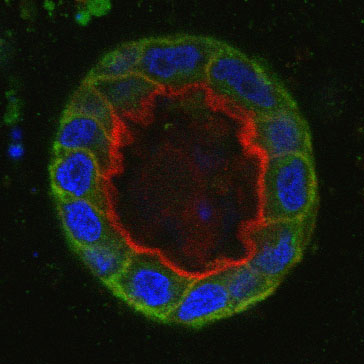 A large number of scientists in the Pittsburgh region dedicate their research to understanding biological membranes. It is the aim of this workshop to bring us all together, help us to place our research into perspective, strengthen our community, and explore opportunities for collaborations within the Pittsburgh region and beyond. More information can be found on the webpage of the workshop. A large number of scientists in the Pittsburgh region dedicate their research to understanding biological membranes. It is the aim of this workshop to bring us all together, help us to place our research into perspective, strengthen our community, and explore opportunities for collaborations within the Pittsburgh region and beyond. More information can be found on the webpage of the workshop.
|
Workshop on molecular Self-Assembly in Biology and Materials Science, June-08 to June-12, 2010
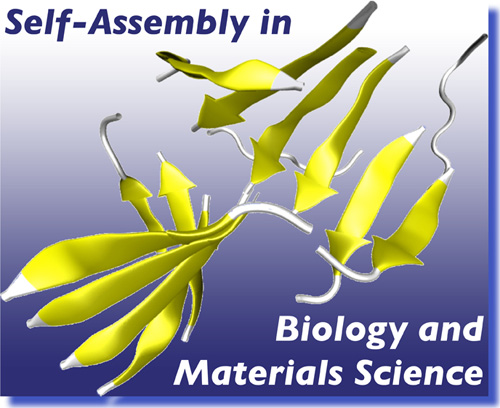 Mathias Lösche and Jaime Ruiz-Garcia of the Universidad Autonóma de San Luis Potosí in México are the co-organizers of a bilateral, U.S./Méxican workshop on Self-Assembly in Biology and Materials Science that takes place in Bahias de Huatulco, Oaxaca province, México, between June-08 and June-12, 2010. This workshop is jointly funded by the U.S. NSF and the Méxican CONACyT. The generous funding by these agencies support the participation of more than 30 senior researchers, mostly at the faculty level, as well as post-docs and graduate students. Besides fostering science communication, the workshop will provide an environment for the establishment and continuation of joint research initiatives between the Méxican and U.S. scientific research communities working in these areas. Mathias Lösche and Jaime Ruiz-Garcia of the Universidad Autonóma de San Luis Potosí in México are the co-organizers of a bilateral, U.S./Méxican workshop on Self-Assembly in Biology and Materials Science that takes place in Bahias de Huatulco, Oaxaca province, México, between June-08 and June-12, 2010. This workshop is jointly funded by the U.S. NSF and the Méxican CONACyT. The generous funding by these agencies support the participation of more than 30 senior researchers, mostly at the faculty level, as well as post-docs and graduate students. Besides fostering science communication, the workshop will provide an environment for the establishment and continuation of joint research initiatives between the Méxican and U.S. scientific research communities working in these areas.
Enter the workshop website here.
|
Tristan Bereau receives Astrid and Bruce McWilliams graduate fellowship
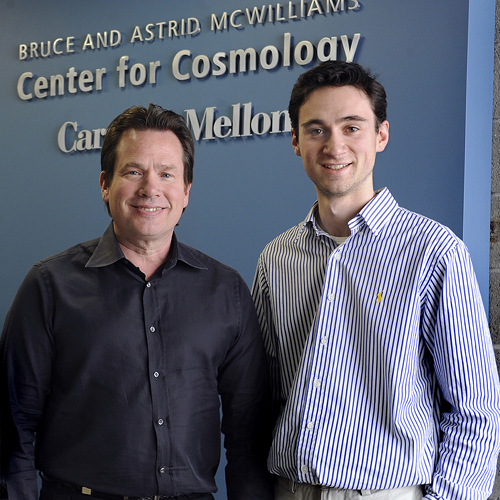 The Astrid and Bruce McWilliams Fellowship in the Mellon College of Science was established in 2007 by alumnus Bruce McWilliams, chairman of Tessera Technologies’ board of directors and the company’s chief strategy officer; and his wife, Astrid McWilliams. It provides tuition, stipend and fees for up to one year of graduate study, as well as $1000 for conference travel or other research expenses. In 2010 Tristan Bereau has won this fellowship for his continuing successful work on modeling coarse grained peptides (see also his publication in the Journal of Chemical Physics) and studying their thermodynamic and kinetic behavior using state of the art techniques from numerical statistical physics (see his publication in the Journal of Computational Physics). The Astrid and Bruce McWilliams Fellowship in the Mellon College of Science was established in 2007 by alumnus Bruce McWilliams, chairman of Tessera Technologies’ board of directors and the company’s chief strategy officer; and his wife, Astrid McWilliams. It provides tuition, stipend and fees for up to one year of graduate study, as well as $1000 for conference travel or other research expenses. In 2010 Tristan Bereau has won this fellowship for his continuing successful work on modeling coarse grained peptides (see also his publication in the Journal of Chemical Physics) and studying their thermodynamic and kinetic behavior using state of the art techniques from numerical statistical physics (see his publication in the Journal of Computational Physics).
|
Deserno teaches at Winter School in Levi, Finland
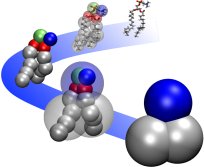 One of the challenging aspects of biomolecular simulations is the vast range of time- and length-scales which must be covered. Coarse grained simulations provide a solution to conquer bigger system and study them for a longer time, but care must be taken that during the process of eliminating degrees of freedom important physics is accidentally eliminated as well. During March 7–12 2010 an International Workshop (a "Winter School") will be held in Levi, Finland, in which such questions will be amply addressed. A special focus will also be on hands-on experiences with current important simulation tools at typical levels of resolution. The focus will be on biomembranes. Lecturers at this school will be Siewert-Jan Marrink (University of Groeningen, the Netherlands), Alex de Vries (University of Groeningen, the Netherlands), Luca Monticelli (INSERM Paris, France), Markus Deserno (Carnegie Mellon University, USA), and Will Noid (Penn State University, USA). Additionally, there will be three invited research talks by Julian Shillcock (MEMPHYS, University of Southern Denmark), Ilpo Vattulainen (Tampere University of Technology, Finland), and Alex Bunker (University of Helsinki, Finland). One of the challenging aspects of biomolecular simulations is the vast range of time- and length-scales which must be covered. Coarse grained simulations provide a solution to conquer bigger system and study them for a longer time, but care must be taken that during the process of eliminating degrees of freedom important physics is accidentally eliminated as well. During March 7–12 2010 an International Workshop (a "Winter School") will be held in Levi, Finland, in which such questions will be amply addressed. A special focus will also be on hands-on experiences with current important simulation tools at typical levels of resolution. The focus will be on biomembranes. Lecturers at this school will be Siewert-Jan Marrink (University of Groeningen, the Netherlands), Alex de Vries (University of Groeningen, the Netherlands), Luca Monticelli (INSERM Paris, France), Markus Deserno (Carnegie Mellon University, USA), and Will Noid (Penn State University, USA). Additionally, there will be three invited research talks by Julian Shillcock (MEMPHYS, University of Southern Denmark), Ilpo Vattulainen (Tampere University of Technology, Finland), and Alex Bunker (University of Helsinki, Finland).
Many more details about this event — including instructions for how to apply — can be found on the webpage of this workshop.
|
Garoff, Tilton, Przybycien receive NSF grant to probe mechanisms for enhancing drug delivery in the lung
Garoff in collaborations with Robert Tilton and Todd Przybycien of the Biomedical and Chemical Engineering Departments have received a grant from the Engineering Directorate at the NSF to explore surface tension gradient driven flows. This work will establish the fundamental wetting mechanisms required to harness surface tension gradient driven (Marangoni) flows to enhance spreading of drug delivered by aerosols in the lung. This effort is part of a broader collaboration between the Complex Fluids group at Carnegie Mellon and the Pulmonary Medicine group at the University of Pittsburgh to look for new lung therapies utilizing surfactants.
|
Deserno receives CDI grant from the NSF
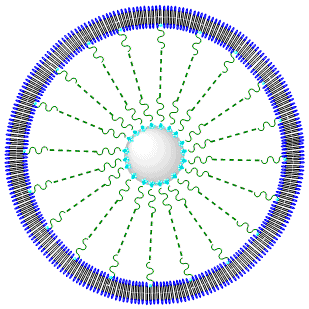 The NSF's CDI program stands for "Cyber-enabled Discovery and Innovation". It's aims are to "explore radically new concepts, approaches and tools at the intersection of computational and physical or biological worlds." Together with Prof. Roland Faller (UC Davis, coordinating PI), Prof. Amadeu Sum (Colorado School of Mines), Prof. Richard Gandour and Prof. Alan Esker (both VirginiaTech) Deserno will explore combined computational and experimental strategies to cyber-engineer functional nanoparticles for targeted drug delivery. Specifically, the Deserno group will use coarse-grained simulations, linked to two finer scales (Faller, Sum) and experiment (Gandour, Esker) to investigate how flat and curved surfaces can be coated with lipid membranes by means of tether molecules. A major aspect of the project, which is funded for 4 years, will also be the development of automated tools for linking simulations at different levels of resolution and experimental data and procedures. The NSF's CDI program stands for "Cyber-enabled Discovery and Innovation". It's aims are to "explore radically new concepts, approaches and tools at the intersection of computational and physical or biological worlds." Together with Prof. Roland Faller (UC Davis, coordinating PI), Prof. Amadeu Sum (Colorado School of Mines), Prof. Richard Gandour and Prof. Alan Esker (both VirginiaTech) Deserno will explore combined computational and experimental strategies to cyber-engineer functional nanoparticles for targeted drug delivery. Specifically, the Deserno group will use coarse-grained simulations, linked to two finer scales (Faller, Sum) and experiment (Gandour, Esker) to investigate how flat and curved surfaces can be coated with lipid membranes by means of tether molecules. A major aspect of the project, which is funded for 4 years, will also be the development of automated tools for linking simulations at different levels of resolution and experimental data and procedures.
|
2009 Guy C. Berry graduate research award goes to Tristan Bereau
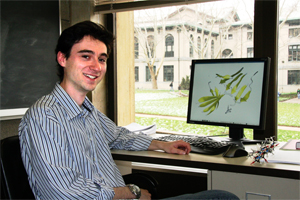 Tristan Bereau wins the 2009 Guy C. Berry Graduate Research Award. This award regognizes excellence in research performed by MCS graduate students. It is named after Guy C. Berry, University Professor at Carnegie Mellon, faculty member in the Department of Chemistry, and former Dean of MCS. Tristan receives this award for his development of coarse-grained peptide models and application of state-of-the-art statistical techniques for probing their thermodynamic behavior, also recently published in the Journal of Chemical Physics. Tristan has been a member of the Deserno group from the first hour, when it was established in the fall of 2007. He received his undergraduate degree from the EPFL Lausanne (Switzerland) and had previously visited the Physics Department of Carnegie Mellon during an academic exchange year. Tristan Bereau wins the 2009 Guy C. Berry Graduate Research Award. This award regognizes excellence in research performed by MCS graduate students. It is named after Guy C. Berry, University Professor at Carnegie Mellon, faculty member in the Department of Chemistry, and former Dean of MCS. Tristan receives this award for his development of coarse-grained peptide models and application of state-of-the-art statistical techniques for probing their thermodynamic behavior, also recently published in the Journal of Chemical Physics. Tristan has been a member of the Deserno group from the first hour, when it was established in the fall of 2007. He received his undergraduate degree from the EPFL Lausanne (Switzerland) and had previously visited the Physics Department of Carnegie Mellon during an academic exchange year.
|
Alex Evilevitch accepts offer to join Biological Physics group at CMU
 Alex Evilevitch joins the CMU Physics Dept., accepting an offer extended earlier within the department's Biological Physics Initiative. Within this initiative, Alex will head the second new experimental group (after the Lösche group formed in 2005). Both experimental groups are complemented by Markus Deserno's theoretical and computational group formed in 2007. Alex Evilevitch joins the CMU Physics Dept., accepting an offer extended earlier within the department's Biological Physics Initiative. Within this initiative, Alex will head the second new experimental group (after the Lösche group formed in 2005). Both experimental groups are complemented by Markus Deserno's theoretical and computational group formed in 2007.
Alex' work focuses on virus biophysics. Viral capsids, with diameters between 10 and 100 nm, protect genomes that are tens of microns in contour length. The majority of viruses possess icosahedral protein shells with thicknesses of only a few nanometers — a single protein layer. Yet, viral particles are stable enough to withstand huge internal forces, exerted by its packaged genome, and external forces from its environment. On the other hand, they must be sufficiently unstable to rapidly release their genome into target cells during infection.
There is thus a unique match between the virus’ genome length and capsid size and strength which is uniquely adjusted to the biological and physical properties of the host cell. Internal genome pressure, reaching tens of atmospheres as a result of strong confinement, is required for phages and many other dsDNA viruses to infect by passive ejection of their genomes. Determining the complex details of these apparently simple interrelations is the focus of research activities of the Evilevitch group. Besides investigating the structural and physico-chemical details of packaged, highly charged linear polymers within the capsids, the group also discovered that the packaged genome provides additional strength to the viral capsid by supporting the fragile structure from the inside — helping the virus survive external stress imposed on it between infection cycles.
More info on the Evilevitch group at Lund can be found here.
|
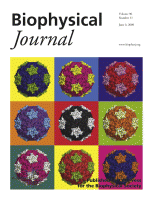 Biophysical Journal features research on viral capsid structure on cover Biophysical Journal features research on viral capsid structure on cover
A paper co-authored by Widom was featured on the cover of the June 3 issue of the Biophysical Journal. The paper applies elastic network models and continuum elasticity to predict the low energy modes of deformation of virus capsids. It turns out these modes can be closely approximated using vector spherical harmonic functions. The other co-authors were Ivet Bahar and Zheng Yang, from the Department of Computational Biology at the University of Pittsburgh. Zheng Yang designed the cover art as a tessellation of capsids in the style of the artist Andy Warhol. |
 NIH funds research on the membrane-mediated toxicity of β-amyloid oligomers in P01 grant [more on science] NIH funds research on the membrane-mediated toxicity of β-amyloid oligomers in P01 grant [more on science]
An NIH Program Grant (1P01 AG032131) is awarded to CMU. We receive generous support for enhancing our research into molecular aspects of Alzheimer's disease. The program is a collaboration between the Deserno and Lösche groups at CMU, the Hall and Glabe labs at UC Irvine and the Valincius group in Vilnius.
Much of the experimental work in this project will be performed at the NIST Center for Neutron Research. We also collaborate with Ralf Langen's group at USC on the deuteration of Aβ peptides for neutron reflectivity measurements.
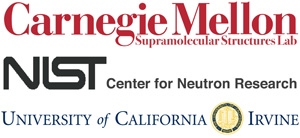
|
|
|
Headlines
|

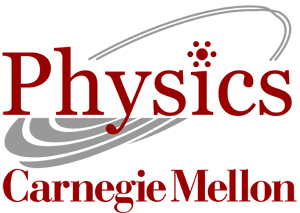

 Mathias Lösche and Jaime Ruiz-Garcia of the Universidad Autonóma de San Luis Potosí in México are the co-organizers of a bilateral, U.S./Méxican workshop on Self-Assembly in Biology and Materials Science that takes place in Bahias de Huatulco, Oaxaca province, México, between June-08 and June-12, 2010. This workshop is jointly funded by the U.S. NSF and the Méxican CONACyT. The generous funding by these agencies support the participation of more than 30 senior researchers, mostly at the faculty level, as well as post-docs and graduate students. Besides fostering science communication, the workshop will provide an environment for the establishment and continuation of joint research initiatives between the Méxican and U.S. scientific research communities working in these areas.
Mathias Lösche and Jaime Ruiz-Garcia of the Universidad Autonóma de San Luis Potosí in México are the co-organizers of a bilateral, U.S./Méxican workshop on Self-Assembly in Biology and Materials Science that takes place in Bahias de Huatulco, Oaxaca province, México, between June-08 and June-12, 2010. This workshop is jointly funded by the U.S. NSF and the Méxican CONACyT. The generous funding by these agencies support the participation of more than 30 senior researchers, mostly at the faculty level, as well as post-docs and graduate students. Besides fostering science communication, the workshop will provide an environment for the establishment and continuation of joint research initiatives between the Méxican and U.S. scientific research communities working in these areas. The Astrid and Bruce McWilliams Fellowship in the Mellon College of Science was established in 2007 by alumnus Bruce McWilliams, chairman of Tessera Technologies’ board of directors and the company’s chief strategy officer; and his wife, Astrid McWilliams. It provides tuition, stipend and fees for up to one year of graduate study, as well as $1000 for conference travel or other research expenses. In 2010 Tristan Bereau has won this fellowship for his continuing successful work on modeling coarse grained peptides (see also his
The Astrid and Bruce McWilliams Fellowship in the Mellon College of Science was established in 2007 by alumnus Bruce McWilliams, chairman of Tessera Technologies’ board of directors and the company’s chief strategy officer; and his wife, Astrid McWilliams. It provides tuition, stipend and fees for up to one year of graduate study, as well as $1000 for conference travel or other research expenses. In 2010 Tristan Bereau has won this fellowship for his continuing successful work on modeling coarse grained peptides (see also his  One of the challenging aspects of biomolecular simulations is the vast range of time- and length-scales which must be covered. Coarse grained simulations provide a solution to conquer bigger system and study them for a longer time, but care must be taken that during the process of eliminating degrees of freedom important physics is accidentally eliminated as well. During March 7–12 2010 an International Workshop (a "Winter School") will be held in Levi, Finland, in which such questions will be amply addressed. A special focus will also be on hands-on experiences with current important simulation tools at typical levels of resolution. The focus will be on biomembranes. Lecturers at this school will be
One of the challenging aspects of biomolecular simulations is the vast range of time- and length-scales which must be covered. Coarse grained simulations provide a solution to conquer bigger system and study them for a longer time, but care must be taken that during the process of eliminating degrees of freedom important physics is accidentally eliminated as well. During March 7–12 2010 an International Workshop (a "Winter School") will be held in Levi, Finland, in which such questions will be amply addressed. A special focus will also be on hands-on experiences with current important simulation tools at typical levels of resolution. The focus will be on biomembranes. Lecturers at this school will be  The NSF's
The NSF's  Tristan Bereau wins the 2009
Tristan Bereau wins the 2009  Alex Evilevitch joins the CMU Physics Dept., accepting an offer extended earlier within the department's Biological Physics Initiative. Within this initiative, Alex will head the second new experimental group (after the Lösche group formed in 2005). Both experimental groups are complemented by Markus Deserno's theoretical and computational group formed in 2007.
Alex Evilevitch joins the CMU Physics Dept., accepting an offer extended earlier within the department's Biological Physics Initiative. Within this initiative, Alex will head the second new experimental group (after the Lösche group formed in 2005). Both experimental groups are complemented by Markus Deserno's theoretical and computational group formed in 2007.

